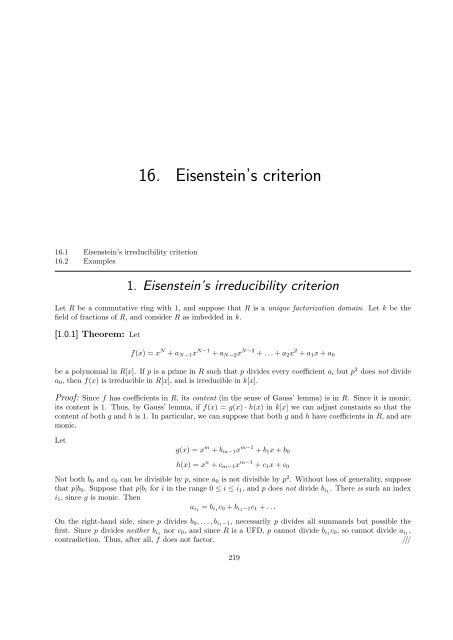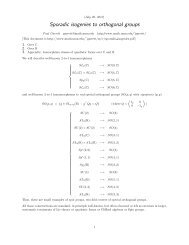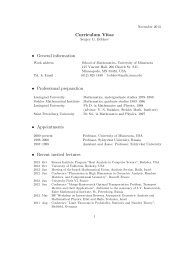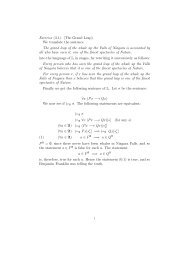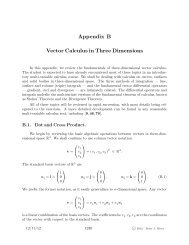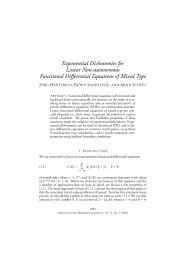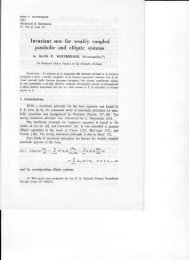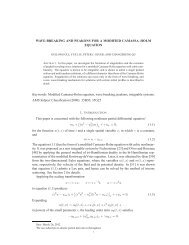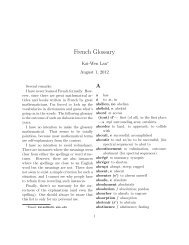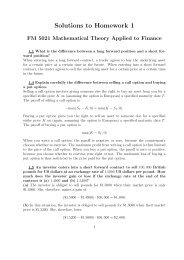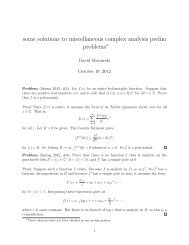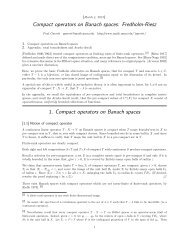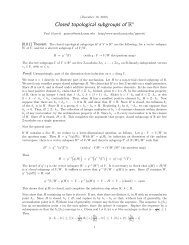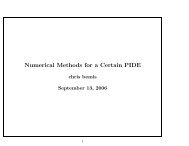16. Eisenstein's criterion
16. Eisenstein's criterion
16. Eisenstein's criterion
You also want an ePaper? Increase the reach of your titles
YUMPU automatically turns print PDFs into web optimized ePapers that Google loves.
<strong>16.</strong> Eisenstein’s <strong>criterion</strong><br />
<strong>16.</strong>1 Eisenstein’s irreducibility <strong>criterion</strong><br />
<strong>16.</strong>2 Examples<br />
1. Eisenstein’s irreducibility <strong>criterion</strong><br />
Let R be a commutative ring with 1, and suppose that R is a unique factorization domain. Let k be the<br />
field of fractions of R, and consider R as imbedded in k.<br />
[1.0.1] Theorem: Let<br />
f(x) = x N + a N−1 x N−1 + a N−2 x N−2 + . . . + a 2 x 2 + a 1 x + a 0<br />
be a polynomial in R[x]. If p is a prime in R such that p divides every coefficient a i but p 2 does not divide<br />
a 0 , then f(x) is irreducible in R[x], and is irreducible in k[x].<br />
Proof: Since f has coefficients in R, its content (in the sense of Gauss’ lemma) is in R. Since it is monic,<br />
its content is 1. Thus, by Gauss’ lemma, if f(x) = g(x) · h(x) in k[x] we can adjust constants so that the<br />
content of both g and h is 1. In particular, we can suppose that both g and h have coefficients in R, and are<br />
monic.<br />
Let<br />
g(x) = x m + b m−1 x m−1 + b 1 x + b 0<br />
h(x) = x n + c m−1 x m−1 + c 1 x + c 0<br />
Not both b 0 and c 0 can be divisible by p, since a 0 is not divisible by p 2 . Without loss of generality, suppose<br />
that p|b 0 . Suppose that p|b i for i in the range 0 ≤ i ≤ i 1 , and p does not divide b i1 . There is such an index<br />
i 1 , since g is monic. Then<br />
a i1 = b i1 c 0 + b i1−1c 1 + . . .<br />
On the right-hand side, since p divides b 0 , . . . , b i1−1, necessarily p divides all summands but possible the<br />
first. Since p divides neither b i1 nor c 0 , and since R is a UFD, p cannot divide b i1 c 0 , so cannot divide a i1 ,<br />
contradiction. Thus, after all, f does not factor. ///<br />
219
220 Eisenstein’s <strong>criterion</strong><br />
2. Examples<br />
[2.0.1] Example: For a rational prime p, and for any integer n > 1, not only does<br />
x n − p = 0<br />
not have a root in Q, but, in fact, the polynomial x n − p is irreducible in Q[x].<br />
[2.0.2] Example: Let p be a prime number. Consider the p th cyclotomic polynomial<br />
Φ p (x) = x p−1 + x p−2 = . . . + x 2 + x + 1 = xp − 1<br />
x − 1<br />
We claim that Φ p (x) is irreducible in Q[x]. Although Φ p (x) itself does not directly admit application of<br />
Eisenstein’s <strong>criterion</strong>, a minor variant of it does. That is, consider<br />
f(x) = Φ p (x + 1) = (x + 1)p − 1<br />
(x + 1) − 1 = xp + ( )<br />
p<br />
1 x p−1 + ( )<br />
p<br />
2 x p−2 + . . . + ( )<br />
p<br />
p−2 x 2 + ( p<br />
p−1)<br />
x<br />
x<br />
( ( ( ) ( )<br />
p p p p<br />
= x p−1 + x<br />
1)<br />
p−2 + x<br />
2)<br />
p−3 + . . . + x +<br />
p − 2 p − 1<br />
All the lower coefficients are divisible by p, and the constant coefficient is exactly p, so is not divisible<br />
by p 2 . Thus, Eisenstein’s <strong>criterion</strong> applies, and f is irreducible. Certainly if Φ p (x) = g(x)h(x) then<br />
f(x) = Φ p (x + 1) = g(x + 1)h(x + 1) gives a factorization of f. Thus, Φ p has no proper factorization.<br />
[2.0.3] Example: Let f(x) = x 2 + y 2 + z 2 in k[x, y, z] where k is not of characteristic 2. We make<br />
identifications like<br />
k[x, y, z] = k[y, z][x]<br />
via the natural isomorphisms. We want to show that y 2 + z 2 is divisible by some prime p in k[y, z], and<br />
not by p 2 . It suffices to show that y 2 + z 2 is divisible by some prime p in k(z)[y], and not by p 2 . Thus, it<br />
suffices to show that y 2 + z 2 is not a unit, and has no repeated factor, in k(z)[y]. Since it is of degree 2, it<br />
is certainly not a unit, so has some irreducible factor. To test for repeated factors, compute the gcd of this<br />
polynomial and its derivative, viewed as having coefficients in the field k(z): [1]<br />
(y 2 + z 2 ) − y 2 (2y) = z2 = non-zero constant<br />
Thus, y 2 + z 2 is a square-free non-unit in k(z)[y], so is divisible by some irreducible p in k[y, z] (Gauss’<br />
lemma), so Eisenstein’s <strong>criterion</strong> applies to x 2 + y 2 + z 2 and p.<br />
[2.0.4] Example: Let f(x) = x 2 + y 3 + z 5 in k[x, y, z] where k is not of characteristic dividing 30. We<br />
want to show that y 3 + z 5 is divisible by some prime p in k[y, z], and not by p 2 . It suffices to show that<br />
y 3 + z 5 is divisible by some prime p in k(z)[y], and not by p 2 . Thus, it suffices to show that y 2 + z 2 is not<br />
a unit, and has no repeated factor, in k(z)[y]. Since it is of degree 2, it is certainly not a unit, so has some<br />
irreducible factor. To test for repeated factors, compute the gcd of this polynomial and its derivative, viewed<br />
as having coefficients in the field k(z): [2]<br />
(y 2 + z 2 ) − y 2 (2y) = z2 = non-zero constant<br />
[1]<br />
It is here that the requirement that the characteristic not be 2 is visible.<br />
[2]<br />
It is here that the requirement that the characteristic not be 2 is visible.
Garrett: Abstract Algebra 221<br />
Thus, y 2 + z 2 is a square-free non-unit in k(z)[y], so is divisible by some irreducible p in k[y, z] (Gauss’<br />
lemma), so Eisenstein’s <strong>criterion</strong> applies to x 2 + y 2 + z 2 and p.<br />
Exercises<br />
<strong>16.</strong>[2.0.1] Prove that x 7 + 48x − 24 is irreducible in Q[x].<br />
<strong>16.</strong>[2.0.2] Not only does Eisenstein’s <strong>criterion</strong> (with Gauss’ lemma) fail to prove that x 4 + 4 is irreducible<br />
in Q[x], but, also, this polynomial does factor into two irreducible quadratics in Q[x]. Find them.<br />
<strong>16.</strong>[2.0.3] Prove that x 3 + y 3 + z 3 is irreducible in k[x, y, z] when k is a field not of characteristic 3.<br />
<strong>16.</strong>[2.0.4] Prove that x 2 + y 3 + z 5 is irreducible in k[x, y, z] even when the underlying field k is of<br />
characteristic 2, 3, or 5.<br />
<strong>16.</strong>[2.0.5] Prove that x 3 + y + y 5 is irreducible in C[x, y].<br />
<strong>16.</strong>[2.0.6] Prove that x n + y n + 1 is irreducible in k[x, y] when the characteristic of k does not divide n.<br />
<strong>16.</strong>[2.0.7] Let k be a field with characteristic not dividing n. Show that any polynomial x n − P (y) where<br />
P (y) has no repeated factors is irreducible in k[x, y].


